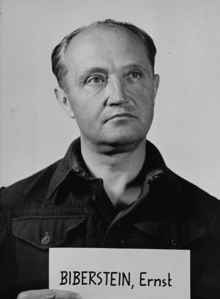Ernst Biberstein
Ernst Emil Heinrich Biberstein (born February 15, 1899 in Hilchenbach as Ernst Szymanowski ; † December 8, 1986 in Neumünster ) was a Protestant pastor , member of the NSDAP , SS-Obersturmbannführer and head of Einsatzkommando 6 of Einsatzgruppe C in Rostow , Russia .
Life
Biberstein was born in Hilchenbach in the Siegen district in 1899 under the name Ernst Szymanowski. He lived here with his family for about two years until April 30, 1901. In 1906 the family moved to Neumünster in Schleswig-Holstein , where he passed his Abitur in 1917 . He was a soldier from 1917 to 1919. He then studied Protestant theology from 1919 to 1921 .
In 1924 he received his first pastor's position in Kaltenkirchen . In October 1933 he officiated for a few weeks as provisional provost of Neumünster. From November 1933 to August 1935 he was church provost of Segeberg .
Szymanowski joined the NSDAP as early as 1926 (membership number 40.718); In 1934 he became district trainer of the NSDAP. From 1935 he made a party career. He was Senior Government in the Reich Church Ministry and entered 1936 as untersturmführer in the SD of the SS one. This was followed by promotions to SS-Obersturmführer , SS-Hauptsturmführer and in 1939 to SS-Sturmbannführer . Szymanowski resigned from the church in 1938. During the Second World War from March to October 1940 he was a soldier in a state rifle battalion during the German attack in the west .
In 1941 he became head of the Gestapo in Opole . In the same year he changed his family name from Szymanowski to Biberstein.
In June 1942, Biberstein was posted to Kiev , Ukraine , as the leader of Einsatzkommando 6 of Einsatzgruppe C. Until 1943 he ordered the murder of 2,000 to 3,000 people, mostly Jews . He himself stated this number in an affidavit for the American military tribunal in the context of the Nuremberg trials . In the same statement, he described in a completely unemotional way how he had personally watched the killing of 50 to 60 people in a gas truck .
After 1945
Because of his involvement in the actions of the Einsatzkommando 6, he was sentenced to death in the Einsatzgruppen trial . Unlike other convicts, he was not executed , but pardoned to life imprisonment in 1951 and released on May 9, 1958 from the Landsberg war crimes prison . Decisive for this was the commitment of the Evangelical Schleswig-Holstein regional church . After his release he worked temporarily in the church administration in Neumünster until he was released there. After that he could not find a job in the church and worked in changing, poorly paid positions until retirement age.
The Evangelical Lutheran parish of Kaltenkirchen ( Segeberg district ) commemorates the victims of the former pastor who preached at Michaeliskirche from 1927 to 1933 with a warning plaque set up in April 2015. The pastor's name is not mentioned on the board in the service room. The community had already co-financed the printing of a critical biography on Ernst Biberstein in 2009.
literature
- Stephan Linck: Ernst Szymanowski alias Biberstein. A theologian on the wrong track. In: Klaus-Michael Mallmann, Gerhard Paul (Ed.): Careers of violence. National Socialist perpetrator biographies. Scientific Book Society, Darmstadt 2004, ISBN 3-534-16654-X .
- Gerhard Hoch : Ernst Szymanowski-Biberstein. The traces of a pastor from Kaltenkirchen . Wachholtz Verlag, Neumünster 2009, ISBN 978-3-529-05881-3 .
Web links
- Biberstein's affidavit about his work in the task force 6
- Pastors under the swastika
- Website of the North Elbian Evangelical Lutheran Church
- Rainer Hering, Rafael Pilsczek: Holy sacrifices for Hitler. The Biberstein case and the Protestant Church. In: Die Zeit , No. 16/2000.
- Institute for Contemporary History Munich-Berlin: Witness literature online. ZS 1014, Biberstein, Ernst (PDF; 624 kB). Affidavit by Biberstein, July 2, 1947 regarding executions by gas truck and shot in the neck by Einsatzkommando 6 of Einsatzgruppe C in Russia; Rostov.
Individual evidence
- ↑ Biberstein's affidavit 1947
- ↑ a b Ernst Klee : The dictionary of persons on the Third Reich. Who was what before and after 1945 . Fischer Taschenbuch Verlag, Second updated edition, Frankfurt am Main 2005, p. 47.
- ↑ Hamburger Abendblatt of April 17, 2015, p. 12 as well as the Norderstedt regional edition
| personal data | |
|---|---|
| SURNAME | Biberstein, Ernst |
| ALTERNATIVE NAMES | Szymanowski, Ernst |
| BRIEF DESCRIPTION | German Protestant pastor, SS-Obersturmbannführer |
| DATE OF BIRTH | February 15, 1899 |
| PLACE OF BIRTH | Hilchenbach |
| DATE OF DEATH | December 8, 1986 |
| Place of death | Neumunster |
